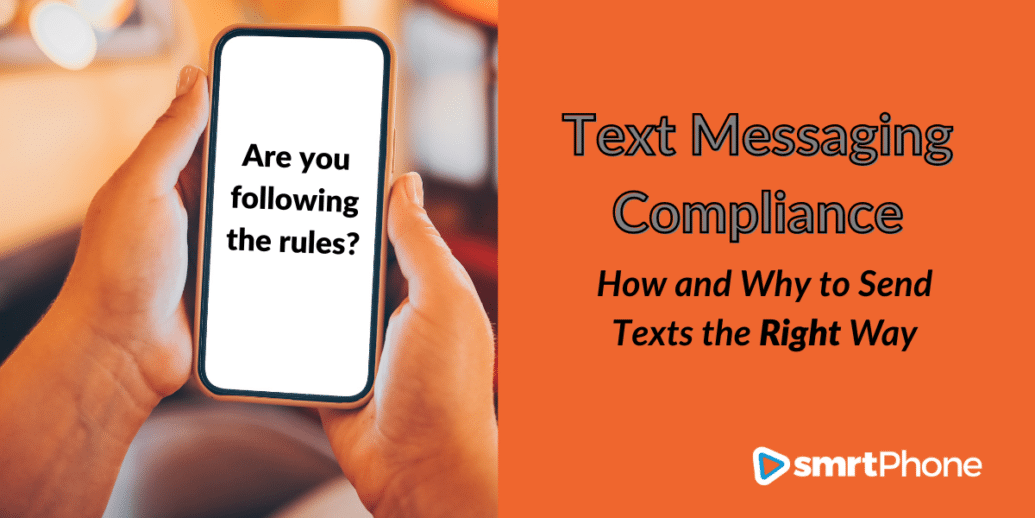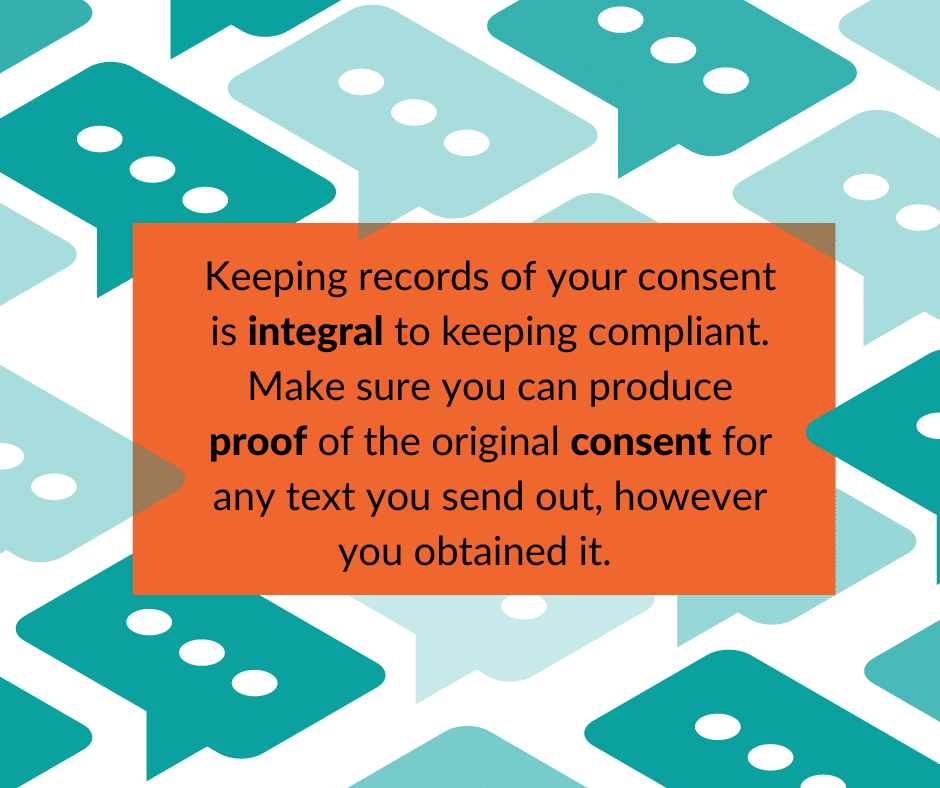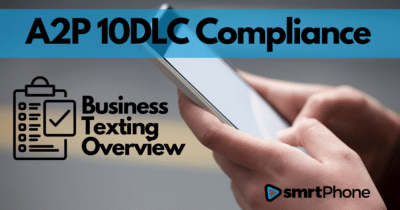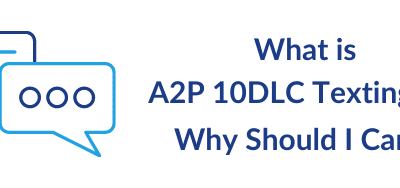This blog was updated on December 23, 2024
Text messaging is often a great way to reach your ideal client or consumer: it feels like everyone is on their phones these days, and data backs up that read rates for texts are higher than email. But that doesn’t mean you should dive into the deep end without research or thought. There are laws and regulations about how to text consumers, and beyond that, you don’t want to annoy or breach the trust of those you want to do business with. There’s a right and wrong way to go about business texting, so let’s go over compliance and best practices when it comes to using SMS for business.
We’ve previously published a blog about the different types of business texting if you want a primer, but this overview will focus in depth on compliance, and why you should care about keeping compliant.
Since this blog was first published in 2022, major mobile carriers began implementing and enforcing A2P 10DLC registration in much higher volume. Now it’s considered mandatory for anyone engaging in business texting from an application (A2P 10DLC stands for “Application-to-Person 10 Digit Long Code”).
At smrtPhone, we take compliance seriously and help all of our users register for A2P 10DLC — in fact, we require it! By only allowing compliant text messages to be sent from our system, we help keep the entire ecosystem safer. This can decrease downtime for everyone, and lower the chances of our users being hit with major fines. Want to learn more? Head to our blog or our documentation. Once you’ve registered, you’ll still need consent in order to text. Read on to learn more!
What IS Consent?
Consent is one of the major building blocks of sending compliant text messages. If you think about it, it’s the first step of any text message, because without consent, the text can’t be sent at all. Consent is often called opt-in when referring to SMS, and what it really boils down to is ensuring the recipient has agreed to receive your texts. And we mean explicit opt-in – the absence of consent is automatically considered non-consent.
This may seem like a hurdle as a business – getting consent for EVERY potential lead and customer? But these rules help bad actors from spamming and scamming. In the long run, rules and regulations around texting actually help bolster legitimacy and trust in the businesses who text appropriately. Don’t just be compliant to avoid fines and throttling – do it because it’s the right way to start any professional relationship, with trust from your customers that you do things the right way. Plus, once you’ve set up an established system to receive opt-in, it might not be as laborious as you’re expecting.
How Do I Get Consent?
There are a couple of ways to get consent from the people you’re texting. When someone signs up for your product or service, you can have them consent as part of signing up. Or maybe you’ve noticed that when you go online shopping, a pop-up window will offer you 10% off if you sign up via text. In small print they reserve the right to text you in the future, and it should specify what types of messages they’ll be sending (or even what they promise not to send!). This is one way a business exercises compliance; as long as they make clear what types of messages they’ll send you in the future, you are granting them access to receive those texts.
However, if that same retailer says they’ll only send you texts about one sale and then start sending you texts about sweepstakes or other marketing, then they’ve broken the established rules they set out, and therefore are no longer compliant. The rules revolve around the customer having expectations set, and then having those expectations met.
Another way to achieve consent? If the a consumer texts you first. Let’s say you’ve posted signs that invites people to text if they have a house to sell. If they reach out first, it’s fair game to text them back, and start the texting relationship.
Opting Out: Consent Can Be Revoked At Any Time
The first time you text anyone, you must make it clear how they can revoke consent or opt out of communication. What does that look like? A very common practice is saying “type stop to unsubscribe.” You can also provide other words to immediately end communication: CANCEL, END, NO. What you’re aiming to do is give the recipient a very clear way to opt out of communication from you, so that you can immediately mark them as DNC (Do Not Call), and avoid communication in the future.
DNC lists are an important part of keeping compliant, and should be utilized as a way to keep track of everyone who has asked to not be contacted by you. DNC list management can be aided by your phone system: once a number is on your DNC list, smrtPhone will disable outbound calls to that number by your entire team.
Remember that the National DNC list should be permanent: you can’t take anyone off the DNC list without their consent. In fact, it’s often good practice to check those registries before making any first contact – even if you didn’t know someone was on a DNC list doesn’t mean you’re not responsible if the FTC or FCC come knockin.’ Be proactive and vigilant as a rule to avoid fines and becoming a known bad actor to carriers or those who enforce regulations.
What Else Shouldn’t I Do?
This list from our carrier, Twilio, is a great start:
- anything that is illegal in the jurisdiction where the message recipient lives (Ex: sending marketing about cannabis in a state where it is not legal, even if it’s legal in your state).
- hate speech, harassment, exploitative, abusive, or any communications that originate from a hate group
- fraudulent messages
- malicious content, such as malware or viruses
- any content that is designed to intentionally evade filters (Ex: intentionally misspelled words as opt-out phrases to make opting out confusing).
These may seem obvious, and if you’re conducting a legitimate business, these should be the easiest rules to follow.
Additional Best Practices For Texting
In general, you also want to follow guidelines that aren’t mandatory, but make good business sense.
- Keep in mind the time zone when texting, and avoid texts that will wake anyone up.
- Don’t over-text – it’s a surefire way to annoy your customer or force an opt-out from someone who otherwise would have been interested, but was turned off by the volume.
- Keep those texts short! Long texts are a lose-lose: they can cost extra if they go over a certain number of characters and they’re less likely to be read.
- Be succinct, be clear, and if possible, have a very obvious call-to-action. Give your recipient a link to go to or a number to call.
What can happen to me if I break any rules?
When you break text messaging compliance rules, there are multiple ways you can feel the repercussions. For example, carriers such as Twilio reserve the right to stop sending messages for any individual or business that they discover to be breaking rules. In this instance, you could lose the ability to work with a major platform – and it’s common for a company like Twilio to power communication for multiple phone systems. When you get kicked off of CallRail by Twilio, you could also be in hot water with Aircall, smrtPhone, and more.
You also want to be thinking about your trust score: soon every business will need to be registered in order to do business texting, and with that registration comes a trust score compiled by mobile carriers. Basically, this score is meant to determine whether your texts should or should not be reaching customers. If your trust score falls, your texts will be throttled and eventually will stop being sent. This is a recent law – as of March 2022 – and the repercussions are only ramping up. The carriers have a vested interest in keeping scams and spammers from reaching their paying customers. Staying compliant will soon be the only way to ensure your texts get delivered.
Thirdly, there are potential monetary fines that can come down from the FCC and/or the FTC. The Telephone Consumer Protection Act (TCPA) established enforceable laws around communication that is applicable to texting even though texting didn’t exist in 1991 when it was enacted. Fines are $500 per violation, and can go up to $1500 per violation for willful violation – and the TCPA allows for uncapped damages which means those fines can stack quickly. Think about it this way – if you text one person ten times, that’s ten fines.
But what makes a GOOD text?
This is a great opportunity to go over what makes an effective text:
- You’ve received explicit opt-in
- The recipient is on no DNC lists
- You’ve made it clear who is sending the message
- It’s short and succinct – leave the storytelling for your website
- There’s a call-to-action – make those texts actionable!
- It’s clear how to opt out of future texts, usually with one simple reply
Remember that if you’re a legitimate business, these rules are extremely easy to follow. If you break one by accident, there will often be a good faith response by phone systems, platforms, and carriers. But continuing to make mistakes, either by carelessness or willful violation, will guarantee you issues. Check out our article on how to be compliant, and let smrtPhone’s Trust Center help you register for business texting.






